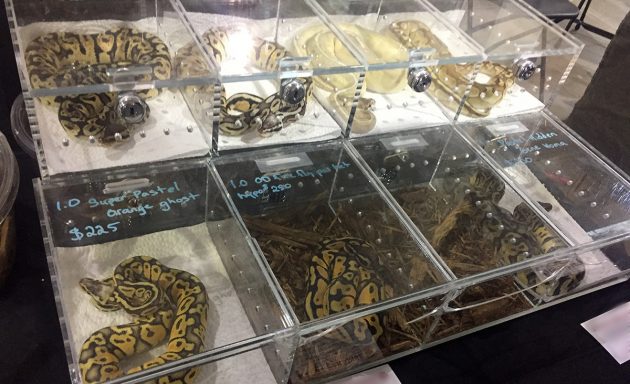
Canadians urge feds to curb global wildlife trade to prevent another pandemic
by CM Staff

World Animal Protection has been calling on Canada and other G20 nations to commit to curbing the wildlife trade

Efforts to stop the global commercial trade of wildlife could significantly reduce the unnecessary suffering of animals and also directly benefit people. Pictured: Pythons at an exotic pets exposition in Canada.
Credit Line: World Animal Protection
Date Created: 06/05/2018 (CNW Group/World Animal Protection)
TORONTO — Canadians are calling on their government to help stop the global commercial wildlife trade through a House of Commons e-petition started by the global charity World Animal Protection.
With over 13,000 signatures the petition was presented in the House of Commons by Conservative Health Critic and Member of Parliament for Calgary Nose Hill, Michelle Rempel Garner.
It urges the government to support the closure of wildlife markets and commit to end the international and domestic trade in wild animals and wild animal parts to prevent the spread of zoonotic diseases.
New recommendations were also recently issued by the WHO, The World Organization for Animal Health (OIE) and the United Nations Environment Program (UNEP) to reduce the risks associated with the wildlife trade. The three agencies are urging nations to suspend the trade in live caught wild mammals for food and breeding and close sections of markets selling live wild mammals.
World Animal Protection has been calling on Canada and other G20 nations to commit to curbing the wildlife trade. Some countries have started to listen. Recently, Italy which holds the G20 Presidency, approved a ban on the import, detention and trade of wild and exotic animals.
“This is a global problem, requiring a global solution and Canada needs to step up to the plate,” said Melissa Matlow, Campaign Director for World Animal Protection Canada in a prepared statement. “Seventy-five per cent of new and emerging infectious diseases affecting human health over the past decade originated from animals, principally from wildlife, including SARS and Ebola. Canadian demand for wild animals and wildlife products, fuels this cruel trade, which drives pandemic risk.”
A recent report by World Animal Protection shows that 1.8 million wild animals were imported into Canada from 76 countries between 2014 and 2019. 93% of these animals were not subject to any permits or pathogen screening.
The government has 45 days to respond to petitions after they are tabled in Parliament.